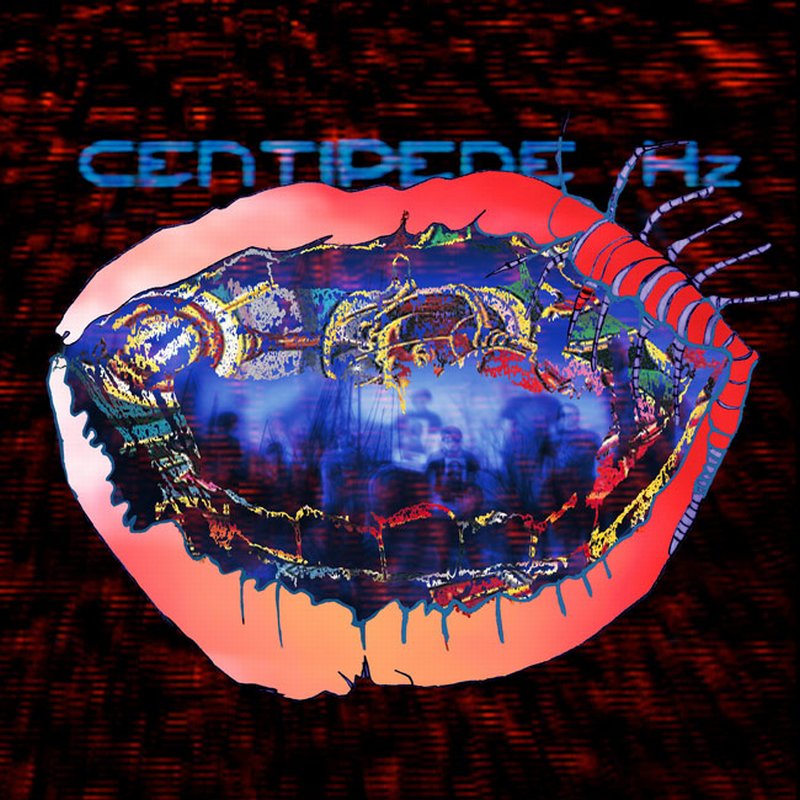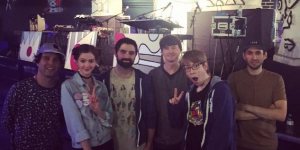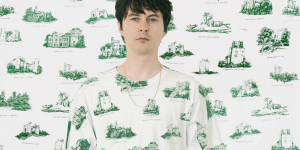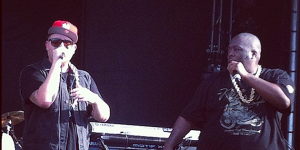TRACK BY TRACK: Animal Collective walk us through 'Centipede Hz'
by Nicole Villeneuve
September 17, 2012
Photo by Atiba
This feature originally appeared in the October issue of AUX Magazine. Download and subscribe for free in the App Store.
In 2009, at the top of Animal Collective’s tenth year as a band, their eighth album Merriweather Post Pavilion made an immediate and lasting impact on indie music at large. What started as a left-of-centre psych-folk recording experiment had evolved into an innovative and revered digital-pop force. In making new album Centipede Hz, the band retreated as a group back to their native Baltimore and tried not to pay much mind to those expectations.
“It’s no doubt that Merriweather was a big leap for us, but so was Feels, and so was Sung Tongs,” says multi-instrumentalist Josh Dibb (aka Deakin). “I always say that it’s hard for me to take ownership over that. I recognize it on some level, but I think that, for us, there’s a disadvantage about thinking about that stuff too much. I’m really grateful that we had the path that we’ve had, in terms of the amount of time and the way that things have grown.”
Centipede Hz marks Dibb’s return to the band after a post-Strawberry Jam hiatus; he walks us through the album, track by track.
Animal Collective – Centipede Hz |
|
 |
1. “Moonjock”
We wanted this record to have high energy and excitement to it, and I think there was a certain element to how we got together to write stuff, to evoke a version of garage rock bands. It just had that sort of excitedness to it. Even the first day we were working on it, I was jumping around while we were playing it, which kind of shows what we’re doing when no one is watching. When we were looking to sequence the record, that one ended up being the really obvious choice [as opener]. There’s something about the way it’s dark, it’s kind of heavy and in your face, and it sort of represented the state of mind we wanted people to be in for the whole record. 2. “Today’s Supernatural” In some ways, “Moonjock” is the actual kickoff to the record, and “Today’s Supernatural” was one of the kick-starters for the actual writing process. It was one of the first songs where I feel we found a satisfying language to work with [in] these songs. So I kind of always refer to it as the totem of the record. There’s a certain emotional, psychological resonance with music that, when it’s there, it’s kind of indescribable, and that song, just the style of lyrics, the way the vocals are, and the way it came together, it still gives me chills, even working on it for so long. It’s just as simple as the “come on, let go” line. There’s something for me about that sentiment, something even from the lyrical kind of melding of vocalization and lyrics. It’s really powerful to me for some reason. 3. “Rosie Oh” “Rosie Oh” is a funny one that took a lot of a convincing, especially on Noah (Lennox, Panda Bear)’s part. He always kind of saw it as a side note or something, and I think we got really attached to it. Dave (Portner, aka Avey Tare) felt he wanted to do something different [other than] guitar; that it was just a certain role he was picking up and he didn’t feel like it fit fully. He started making electronic stuff instead, then my guitar part stayed the same. It was this really cool blending of this kind of digital musical world and more fun Grateful Dead kind of stuff. I think it brings these two worlds together. I really like that one a lot. 4. “Applesauce” I think we literally, over the six weeks we were tracking it, stripped “Applesauce” down to nothing and rebuilt it at least twice. We’ve never played the song live the way that it sounds. It was really like taking little bits and pieces of all these different things that we had tried and editing it to come up with a version that felt like the right thing to us. It’s the only song where we’re really getting together to figure out how to perform it live. We have to almost work backwards. There aren’t really other songs on the record like that. It is a process that we have done a lot before, but it definitely is different in that regard. [It’s] almost more akin to ”Fireworks” or something in the past. 5. “Wide Eyed” This was the first song I ever wrote for the band that we recorded, and as a result, the first time I’ve ever sung a lead vocal part on a record that we’ve done, so that’s definitely a big deal for me personally. Me and Noah started [writing and making music] at the same time at like twelve, thirteen years old. For whatever reason, trying to translate that into the band at any point, I’ve never felt comfortable doing it. I’m sort of a really epic perfectionist. Not that I think the things I end up doing are perfect, kind of the opposite. I’m never really satisfied with the things I do, so it’s really easy to dismiss everything I do and be like “ah it’s not good enough, it’s not good enough, I’m not going to do this.” I think one of the reasons why I ended up taking a break after Strawberry Jam was because I knew we would be so busy as a band moving forward, I felt that I didn’t have very much space to be able to work on my own music and needed a bit of separation from the band to think about it. Just the month before we got together, “Wide Eyed” was starting to come together in my head. In a way it was similar to “Today’s Supernatural.” The essence of it came together very quickly and everybody felt very psyched about it and honed it for a while. I think for me it’s all about steps in that direction. There’s an album I’m meant to make, I’m still working on it and deliberating, but that’s something that I plan on doing at some point in the future, finishing that record and continuing to move forward. 6. “Father Time” The moment we started talking about the record and what we were going to record, at least some of the guys in the band [felt] this one didn’t fit with the record. To me, it seemed like it was taking a backseat. Once we put some effort in and got it recorded, everyone came around and saw how it was a good one. Dave’s lyrics sort of ride this line of having a linear direct statement or story-feeling on it, and at the same time, have this sort of vagueness. When he does that at his best moment, there’s these suggestions of thoughts or ideas or emotions that you can sort of pick up. I feel like you can hear different things in it depending on how you’re listening to it. I really like songs that do that. 7. “New Town Burnout” “New Town Burnout” really stands out to me on this record, actually, because I feel like its different. It’s a weird one. It’s probably the most electronic-based song on the record. It’s primarily this electronic drum beat and sampler, [which is] the stuff I’m doing, with Dave playing keyboard in the background. I think there’s a sonic quality that stands up from other stuff on the record and there’s a lot more space to it. Noah periodically writes these songs about the challenges he feels between [doing music and] wanting to be home and having a family. This one sort of reflects the thing that was going on while we were writing this stuff. We worked out this way of the three or four of us all being in the same place for three months straight. Everyone in general was having a really good time. Getting together everyday and getting to work on stuff and see each other regularly was awesome. I think Noah would say that too, but I think there was this other side that was him feeling really stressed about having to travel with his family. They were all living with his mom in Baltimore. Maybe it’s just an observation that the song was about, but it’s kind of interesting. It was a song that we had worked on for a while before we noticed what it was about. 8. “Monkey Riches” Another kind of totem song. They’re all kind of totem songs. One of the things we tried to talk about before getting together to write was the type of energy we wanted in terms of how we’re playing. And sometimes we’d evoke the JB—that’s the James Brown band. That locked-in tightness, almost soul/funk tightness. Live, too, I feel it hit us pretty quickly in terms of where we put it in the set it. It felt like the peak of the set. I was really psyched on the lyrical content of it from Dave’s perspective in terms of liability. I guess it’s one of the closest things we have to an environmental song. That’s him struggling with the reality of our environmental footprint. I get really pysched on that side of it. It almost reminds me, energy-wise, like what was cool about the JB’s. And Bob Marley. Not that I think most people would pick up on any sort of message in that regards, but I think that’s sort of cool, that it kind of feels like that to me when playing it. 9. “Mercury Man” Noah, for a lot of the lyrics on the record, he wanted to spend more time looking outward than looking inward. This one’s kind of about the frustration of trying to communicate with people. Well, for him it was about trying to deal with a car salesman, when he bought a bad car and had to deal with all this nightmare stuff. Just the frustration of complication between humans that should be like, “I’m a person, you’re a person, can’t we talk like human beings?” Making this album, we talked a lot about imagining an alien band, picking up broken radio frequencies from earth. All these scrambled different stations crossing over each other and cutting in and out, and imagining what it would be like if you were a band from an alien planet, hearing that stuff and trying to piece it together and re-interpret it. That was a way that we established an over-arching marker. “Mercury Man” is a good example of that, the way the sounds move from part to part, and the sounds we were using fit that alien-band model better than any other song on the record. 10. “Pulleys” “Pulleys” sounds different than a lot of the record. There’s a certain thing we tapped into here, the pace of it, there’s this Southeast Asian psych sort of thing. In terms of the way Dave wrote these lyrics, there’s a lot of different ways you can hear it that aren’t what he was thinking but that have very deep, emotional resonance with me. I think it fits really well with the next song. 11. “Amanita” I wonder whether Dave would disagree, because we definitely don’t always discuss like, “what do you mean, man? What does this line mean?” But I know that in “Amanita,” he definitely talked, and we’ve all thought a lot about it over the years, about the potential for good connection in more natural or traditional wisdom. For me, not knowing what goes in to every lyric, I can step out of it and just be a fan. I can trip out on the lyrics in the same way I do with a band that I don’t know. |
Tags: Music, Featured, Interviews, News, animal collective, AUX Magazine, Avey Tare, Josh Dibb





